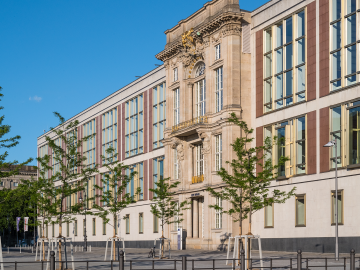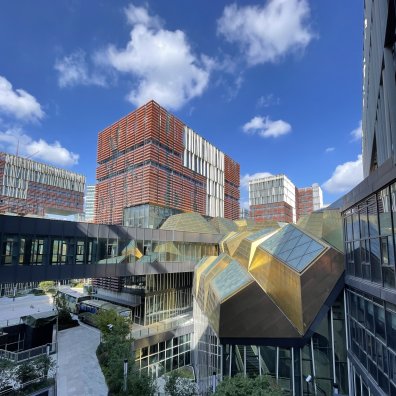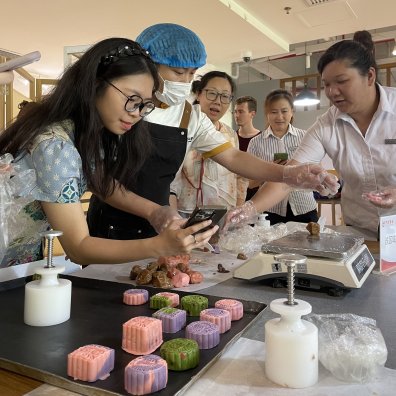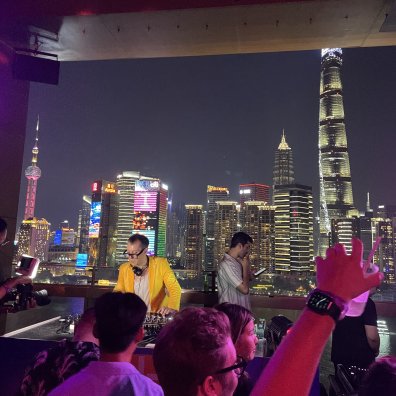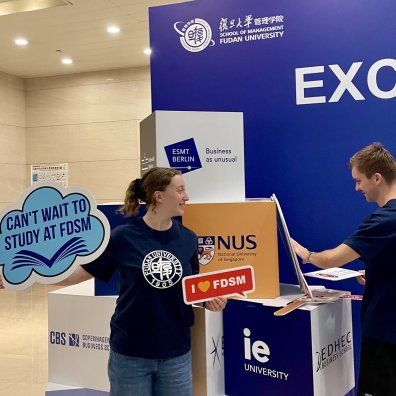Leaving your comfort zone: Lessons from a global exchange in Shanghai

While more than half of these exchange opportunities are based at European partner universities, some are located much farther away, such as Fudan University in Shanghai, China.
That is where Elise Most, a Master's in Global Management alumna, earned the opportunity to spend her exchange semester. She embraced the opportunity to study at Fudan, immersing herself in a very different academic system and cultural environment.
In this article, Elise reflects on what drew her to China, how the experience shaped her personally and academically, and her advice for fellow students considering a path beyond the familiar.
Curiosity, challenge, and global relevance
"Growing up in Europe, I read and heard a lot about China, but not always in a positive light. Especially after Covid, many of the conversations were driven by stereotypes or fear. These negative narratives made me curious, and I wanted to form my own opinion of China, I wanted to see it for myself.”
For Elise, Fudan University offered both a strong academic environment and the chance to experience one of the world’s most important economies up close. Through classes with local professors, case studies, and everyday life in Shanghai, she was able to connect her studies to the realities of doing business in China.
“How are we supposed to make informed decisions or collaborate internationally if we don’t even try to understand the culture we’re working with?”
Having previously studied in Canada and completed an exchange program in Argentina, Elise was eager to explore the Eastern Hemisphere. She thus saw Asia as the next logical step in her global educational journey.
“I hadn’t explored it yet, and this felt like the right time to do so. And because the program is so well structured on both the ESMT and FDSM sides, it’s actually a very low-risk way to take a big leap. You’re far from home, yes, but everything’s taken care of, so you’re not doing it alone.”
Setting yourself up for success before you go
While culture shock or language differences may seem like the biggest hurdles, it's often the small, practical things that shape your first weeks: how easily you can pay for dinner, stay connected, or find your way around.
Here are a few of her key suggestions for anyone preparing to study abroad:
- Sort your visa early – If you’re planning to travel during your exchange, check whether you’ll need a multi-entry visa.
- Download essential apps before you arrive – Some may be difficult to access once you’re abroad, depending on local restrictions or app stores.
- Payments and banking – Consider using a digital bank or virtual card to avoid problems with blocked or declined transactions.
- Connectivity matters – In countries with restricted internet access, a reliable VPN can help you stay connected to essential platforms.
- Be proactive with housing – Decide early whether on- or off-campus housing fits your needs, and make sure you understand the application process and timing.
These might seem like small details but getting them right early can make a big difference. For Elise, having the practical side sorted meant she could focus her energy on what truly mattered: making connections, exploring a new culture, and getting the most out of her exchange.
Lessons that last: Local insights and peer network
For Elise, the academic experience at Fudan laid the groundwork for a future career in international business. What made the learning particularly impactful was not just the content, but the context in which it was taught. Many of her professors were either Chinese or had spent over 15 years living and working in China, bringing a depth of local knowledge that shaped every classroom discussion.
“Just through their teaching, their examples, and the way they approached business topics, they helped us start to understand the Chinese business culture. And honestly, that cultural understanding is essential if you ever want to do business successfully in China.”
Her favorite class, New Venture Creation, stood out for its direct relevance and engaging delivery.
“It was extremely well taught by Alex Wang. The business cases we worked on were all based on Chinese startups and companies, so it really helped us understand how business is done in that specific context.”
However, classroom learning was only part of the equation. What made the semester truly transformative was the network of peers she built along the way. Surrounded by students from all over the world, each taking a leap into unfamiliar territory, Elise found both inspiration and connection.
"It says a lot about their mindset. Meeting and connecting with such driven and curious people, was a huge added value for me, both personally and professionally.”
Living, adapting, and growing during your exchange
Spending time in a new cultural setting means learning to navigate daily life all over again. For Elise, personal growth came from being observant, patient, and open to discomfort. Studying in Shanghai wasn’t simply about adjusting to a new campus, it meant developing a new kind of awareness, one that continues to shape how she approaches international environments.
Here are three pieces of advice she offers to future exchange students:
-
Start by listening
“Listen, observe, read and ask questions before you speak or act. You might think you know a place, its people, or its culture, but you never really get it until you’re actually there. And even then, you won’t get it unless you’re willing to humble yourself, be curious, and try to understand before jumping in with assumptions. That mindset makes all the difference when working in a new or multicultural environment."
-
Give yourself time to adjust
“Treat adapting to a new place like a part-time job on top of your studies or work. It’s a real effort. Even if you’re used to traveling or have lived abroad before, it’s not the same as managing daily life somewhere completely new. The little things you don’t even notice at home become exhausting when everything is unfamiliar. Living in Shanghai made me realize how rewarding but also how mentally and emotionally demanding it is to work in an international setting. It taught me to respect that process more deeply.
-
Create comfort where you can
“Create a little bubble of familiarity in your new space. Your bedroom or apartment should be a place where you can recharge, not just physically, but mentally. Bring photos and posters, a familiar pillowcase and sheets, little objects from home. That comfort zone becomes crucial when everything else around you is new.”
Taking the leap with an international exchange
For students in ESMT's Master programs considering a semester abroad outside Europe, Elise’s story is a powerful reminder of how much growth can come from choosing the unfamiliar. Her time at Fudan University reshaped how she views international business, strengthened her ability to adapt in unfamiliar settings, and expanded her network in ways that will stay with her long after graduation.
She encourages students to reflect on what’s really holding them back. If the concerns are logistical, such as cost, housing, or visa requirements, those can be addressed with planning, research, and support.
“Look into scholarships, grants, or financial support from ESMT or even from German institutions. Ask for help, do more research, reach out to former exchange students. These are obstacles, yes, but they’re manageable.”
But practical hurdles aren’t always the hardest ones to overcome. For many, it’s the emotional uncertainties, being far from home, unfamiliar languages, and cultural adjustments, that create the most hesitation. For Elise, those fears were real. But they were also what made the experience so transformative.
“I dare you to go because you’re afraid. I was afraid too. It’s totally normal. But if I had to choose again, a hundred times over, I’d make the same choice every single time...
”
It’s uncomfortable at first, yes. But it’s also one of the most rewarding things you’ll ever do. You grow in ways you can’t predict, and you come back with a whole new perspective, not just on the world, but on yourself.
Explore your international options
